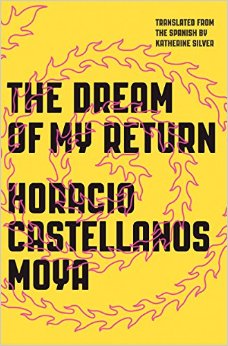You have no items in your cart. Want to get some nice things?
Go shopping
One hot, black midnight in El Salvador a woman answered her phone. “We are going to kill your son,” the voice on the other end informed her.
The marked man – a journalist operating in a country embroiled in violent civil war – duly packed his bags and fled, heading north to the safety of Mexico City.
This is not the tale of the protagonist of The Dream of My Return – although it similar enough that it could be – but instead an incident plucked from the life of the author himself. Horacio Castellanos Moya, one of the Spanish-speaking world’s most interesting novelists, has explored the struggles of the exiles of the Salvadoran Civil War cross several books; in his latest offering, neighbouring Mexico is the stage for an exploration of this turmoil.
Told through the eyes (and not-so-delicate words) of Erasmo Aragon, a Salvadorian journalist exiled to Mexico, we dig through the layers of disillusionment, restless and guilt carried by the political fugitive.
The Salvadorian Civil War exploded with a coup d’état in 1979 and raged violently through the 1980s, coming to an end in 1992. During the conflict, an unknown number of victims were murdered – ‘disappeared’ by the death squads that marauded the country, terrorising citizens with impunity. The UN has since estimated that a total of 75,000 civilians died at the hands of government forces. The deep-seated paranoia that permeates The Dream of My Return evokes this culture of persecution that has followed the exiles of El Salvador, who, we understand, could never have escaped mentally unscathed from a conflict punctuated by atrocities, espionage and psychological terrorism.
Such a weighty history could overwhelm a lesser character, but Erasmo does all he possibly can to avoid facing his past or present in a meaningful way, and so there are ample opportunities for humour and reflection. Moya’s fluid, witty prose brings splashes of magic realism to the narrative, providing a welcome space from which to observe the demons lurking in the backdrop of Erasmo’s everyday life. Our narrator is not a sensitive man, but a bumbling, heavy-drinking, loud-mouthed frequent lech with an inflated sense of his own importance; the grandeur with which Erasmo interprets his meandering thoughts, while providing a comic relief, is matched only by the level of his all-consuming, disorientating paranoia. A complex character, and sometimes not an entirely likeable one, he demonstrates how the internalisation of such profound fear and sadness can wreak havoc on a person’s psyche.
Erasmo buries the painful incidents of his past, including, as it turns out, the murders of his father and his cousin, using a steady diet of drinking, denial and pure fantasy. But these repressed memories eventually rear their head as date of his impending journey to El Salvador draws closer, manifesting themselves a nasty bout of colitis. He seeks a solution for this from a doctor and hypnotist, Don Chente, another Salvadorian exile who has ties to his family. Through Chente’s hypnotising sessions, which Erasmo cannot recall afterwards, he is simultaneously pulled deeper into his past, as fragments of memories begin to surface in his waking life, but also further into his unresolved fears.
On top of burying personal memories, Erasmo has also internalised a fundamental element of life in El Salvador during the civil war: the need to escape. Now as a fugitive in Mexico, Erasmo can’t seem to shake the impulse to abandon everything around him. He has built a good life; he has a girlfriend, a child, and a comfortable job as a wire reporter, which not only puts food on the table (and ample vodka tonics in his stomach) but also gives him enough authority to extricate himself from petty officials searching for bribes. Here in this new country he has a present, a future, and even a recognised past – in short, he has everything denied to him El Salvador. And yet, instead of viewing Mexico as his saviour, he looks down on his adopted home, and the people populating it, focusing all his energy into his plans of leaving.
Erasmo, who was was forced to flee his home so suddenly, is obsessed with his plan to return, to the detriment of all other things in his life. And yet the pull of his home country is not clear. His dream of returning is not based on personal principles, exalted ideals or even revenge, and so precisely what is drawing him back to such danger, and what he expects to find there, is the overarching question.
Moya presents Erasmo as an exploration of personhood when place is stripped away, at least superficially. What has left an indelible mark? What parts, recognised or unrecognised, will never leave? Or, perhaps more hauntingly, will you ever again find the parts of yourself that you have lost?




